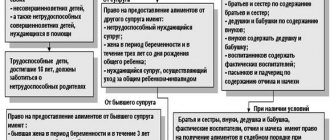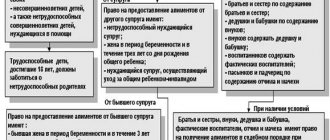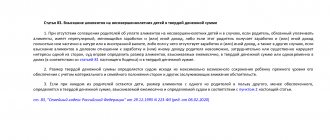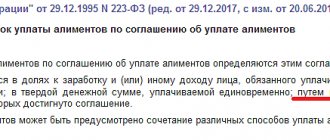According to current legislation, parents are required to support their children who have not reached the age of majority. That is why, in the event of a divorce, the father (mother) leaving the family is obliged to pay alimony. This article will help you figure out how to collect such a payment and what is required for this.
The procedure for collecting alimony
According to the law, financial responsibilities for the maintenance of children are divided equally between the father and mother. If both parents do not participate in the maintenance of the child, alimony is collected from both.
But a more common situation is when the mother of children receives alimony from the father: after a divorce, for an illegitimate child, and even in an existing marriage when living together, if the father refuses to bring wages “to the family.”
Alimony is paid:
- Voluntarily, according to a notarized agreement between the parents
- By order or decision of the court
How this will happen is up to the parents themselves to decide. In some cases, a court order is convenient for the father: he does not have to calculate how much he should pay for the child, he passes the order to the accounting department and “forgets about alimony”, everything happens without his participation.
A peaceful agreement, of course, is preferable, first of all, for the child. The contractual method is the most flexible.
Children can receive assistance in the form of real estate, property, one-time or periodic payments, payment of large expenses or, conversely, a set of groceries once a week, payment for vacations and travel, etc.
That is, the father does not simply “pay off a check” from the child, but participates in its maintenance, in accordance with the specific needs of his son or daughter.
It should be recognized that alimony by agreement is effective only when the parents maintain good relations after the divorce and strive to minimize the harm caused to the child’s emotional development by the destruction of the family. Unfortunately, this approach is still rare.
Quite often, an alimony agreement concluded during a divorce is violated. In this case, the mother can, on this basis, through the court and the FSSP, demand the fulfillment of the promises made by the father. The agreement has the force of an executive document.
If there are initial disagreements about money for children, alimony is collected in court. You can do this simultaneously with the divorce, you can do it after, you can even do it before the divorce. This is perhaps the most convenient.
Alimony in marriage is collected in a simplified order; the procedure takes only 5 days and does not require personal participation in the meeting. After the divorce, the amount of alimony will not change, and nothing will have to be re-registered.
The decision on alimony can be made by the court:
- By order of production
- By way of claim proceedings
The first method is used if there are no fundamental disagreements about “to pay or not to pay” between the parents. The second is if the husband goes into hiding after the divorce, hides his income, tries to challenge paternity, etc.
Initiation of enforcement proceedings
If, after a court decision to pay alimony, the payer still evades this obligation, the recipient has the right to turn to bailiffs for help.
The procedure for initiating enforcement proceedings is described in detail in the Federal Law of the Russian Federation dated October 2, 2007 No. 229-FZ.
What documents to provide to bailiffs
In order for a bailiff to initiate enforcement proceedings in the case of collection of child support, the interested person (usually the recipient of these funds) must provide the following documents to the territorial division of the FSSP:
- statement;
- executive document (this may be a court decision or an agreement on the payment of alimony, violated by the payer);
- child's birth certificate;
- details of the bank account to which alimony payments should be transferred.
REFERENCE. Enforcement proceedings can be initiated not only on the basis of a court decision, but also if there is an agreement on the payment of alimony, since this document has the force of a writ of execution.
Legal ways to influence a debtor
Bailiffs are authorized to use various mechanisms of influence on persons who do not want to fulfill their parental duty to their children. Such instruments of coercion include:
- seizure of the debtor's property;
- automatic debiting of money from a bank account;
- restrictions on crossing the borders of the Russian Federation;
- imposing a temporary ban on driving;
- accrual of fines and penalties, etc.
IMPORTANT! If there are signs of malicious evasion of alimony obligations, a criminal case may be initiated against the debtor. Therefore, it is strongly recommended not to hide from bailiffs.
Suspension or termination of enforcement proceedings
The law provides for situations when enforcement proceedings may be suspended. Is it possible:
- if the recipient of alimony himself has submitted a corresponding application (this happens when the parties manage to resolve the issue peacefully);
- the debtor has lost legal capacity;
- bankruptcy procedures, etc., are applied to the parent obligated to pay child support.
In Art. 120 of the RF IC also describes a list of situations in which alimony obligations, and therefore enforcement proceedings, are terminated. This can happen under the following circumstances:
- the child has turned 18 years old or has become legally competent before reaching the age of majority;
- the baby is adopted by another person;
- the recipient of the funds has died;
- the death of the person obligated to pay alimony has occurred.
Procedure and rules for paying child support
ATTENTION! The procedure and rules for paying contractual alimony are not regulated by law! Parents have the right to agree on anything that suits both parties. There is only one legal requirement - alimony under the contract cannot be less than what the court would determine by its decision. This point will be checked at the notarization stage. On an agreement with “meager” alimony of about 1 thousand rubles per month, the notary simply will not put his stamp.
However, the rules for calculating and paying alimony ordered by the court are clearly regulated.
What is a child support order?
First of all, let us remind you that a court order is an executive document issued by a magistrate. Something between a court decision and a writ of execution. What's the difference? In a lawsuit, you receive a court decision. But after it comes into force, you will also need a writ of execution for forced execution, in the event that the defendant refuses to do this voluntarily. So, issuing an “order” helps save both time and paper.
Although, as Lyudmila Prokofyevna said, the main “mymra” of the Soviet film “Office Romance”: “Our paper industry works excellently.” But still, let's remember that nature, our mother, must be protected.
Methods for calculating alimony
Courts calculate alimony in two ways:
- As a percentage of regular income (25% for one child, 33% for two children, 50% for three or more)
- In the form of a specific monthly amount (calculated on the basis of the minimum wage and subsistence level (LM), if the alimony payer does not have a regular income)
When making calculations, the court takes into account individual circumstances: the financial situation of the father and mother, the state of health of the child and parents, the presence of additional dependents of the alimony payer. The interests of the child are a priority.
The final percentage amount of alimony may be reduced. For example, if there is only one child in a given family, but the father has another one for whom alimony is also paid, the amount of alimony for one child will not be 25%, but 16.5% (33% for two children, divided equally).
It may be increased. For example, if child support is paid not only for the child, but also for the mother (if she is on maternity leave or is disabled), deductions can reach 70% of earnings.
The amount of fixed alimony can be calculated based on the “children’s” minimum wage or as a percentage of 1/2/3 of the minimum wage. If the father has good reasons (health status, lack of work and employment opportunities, dependents), alimony can be multiples of the minimum monthly wage - 0.5, 0.3, 01 subsistence minimum. Fixed alimony is indexed with an increase in the indicator on which it is based (minimum wage or minimum wage).
The law allows for a combination of calculation methods. A fixed amount of alimony may be assigned, plus a certain percentage of earnings.
Cancellation of a court order
As you can already understand from the previous paragraph, a court order is relatively easy to obtain. It is enough to present the magistrate with a small package of documents and the deal is in the bag. However, such executive documents also have a significant disadvantage. They are as easy to challenge as they are to obtain. It is enough for the spouse (current or former) to come to the judge, write in the objections that he does not recognize paternity, and the joint venture will be immediately cancelled. The main thing is not to miss the deadlines established by law.
The magistrate will not figure out who is right and who is wrong. This is not within his competence. He will redirect you to the district authority (for Moscow) or city, if we are talking about the Moscow region. Or to the court of the city where you or the defendant are registered.
In short, in the end it will be necessary to initiate a full-fledged trial - with preliminary meetings in the courtroom, sessions, debates between the parties and the study of evidence. With a battle of lawyers, perhaps. And, alas, with painful meetings with the ex-spouse face to face. But such is the price of truth. And the cost of the money you ultimately receive to raise a child.
By the way, it is necessary to remember that the magistrate considers only those applications in which the plaintiff demands that alimony obligations be established as a percentage of the debtor’s income.
For example, maintenance payments are (as a general rule) and calculated as follows:
- for an only child - a quarter of the debtor’s income;
- for two children - a third (1/6 for each);
- if 3 or more - half of the income. It is difficult to say the exact shares for each, since you need to know the number of minors to whom payments are due. And there are also elderly parents who also have the right to file documents in court, forcing an adult child to pay funds for their maintenance.
If you want to receive a certain amount of maintenance (for example, 20,000 rubles per month), then the magistrate’s court will not help you. Then you need to file a claim in a regular court. It is also a court of general jurisdiction. When might such a solution be needed? For example, the debtor, one of the child’s parents, is an individual entrepreneur or a member of another organization - limited liability (LLC). That is, he is self-employed with a fixed salary, and his earnings are not constant. He simply does not have a stable income.
Or a cunning ex (ex) decided to save money on their child and underestimate their white income. There are many ways to do this. For example, you can issue an order to assign the defendant the minimum salary in the organization he manages.
It turns out that a person is officially barely making ends meet and it’s time for him to ask for social benefits from the state. But he drives through the streets of your city in a brand new premium German car. Moreover, he lives in a modest two or three-story “barn” on the highway in the Rublevo-Uspensky direction of the Moscow region. Well, or in a similar elite “suburb” of another Russian city.
By the way, you will also have to go to the district court if it suddenly turns out that somewhere there is a second offspring (obviously not yours), to whom the defendant pays or is obliged to pay maintenance. In this case, you will have to go to a court of general jurisdiction, even if you want to collect alimony as a percentage of the income of your unlucky other half.
If someone thinks that by canceling the joint venture and other methods they can delay the consideration of the case and not give money longer to support their child, then we have a “surprise-surprise” for you.
Current Russian legislation allows for the recovery of money “retroactively.” This works if the plaintiff proves that he made a request for payment of alimony to the defendant, and he remained sardonicly silent. The plaintiff had to contact the defendant, for example, by registered mail with notification, or via electronic correspondence. And also if he received an order that was later canceled.
Payment methods
The frequency and methods of payments are also regulated by the court. The wishes of the alimony recipient may be taken into account, which should be indicated in the statement of claim:
- Receiving money from hand to hand against receipt
- By transfer to a bank card or account
- By postal transfer
The costs of shipping or transfer are borne by the alimony payer.
Alimony ordered by the court is paid strictly monthly. Payment in advance is not allowed.
ATTENTION! If alimony is transferred not by the accounting department of the enterprise, but by the alimony payer himself, he must save all documents that serve as confirmation of the payment made (checks, receipts, bank statements, receipts of the alimony recipient)
Transfer of alimony upon dismissal
An employee who quits his job receives salary, compensation and other transfers on his last day at work. Alimony is also collected from these payments.
The deadline for transferring payments upon dismissal of a subordinate is 3 working days after the payment of wages.
Within 3 days from the date of dismissal, the enterprise’s accounting department sends the recipient of the funds or the bailiff a writ of execution along with a covering letter. The latter contains information about the dismissal of the alimony worker. On the reverse side of the writ of execution, the amounts and dates of collection of alimony from the former employee’s salary are written down, along with the signature and seal of the manager.
Alimony payment terms
As a general rule, child support is paid until the child reaches the age of majority (18 years). The period of alimony may be reduced or extended. For example, if a child at the age of 16 has undergone the emancipation procedure (obtaining full legal capacity and release from the legal influence of parents by a court decision or guardianship authorities), the payment of child support for him is stopped. On the other hand, alimony for a disabled child is paid even after he reaches adulthood.
Studying at a university, contrary to popular belief, is not a basis for extending the period of alimony payments after 18 years. Although no one can prohibit a father who pays voluntary alimony from helping his child until he finishes his studies and finds a job.
Throughout the entire period of payment of alimony, either parent has the right to file a lawsuit or application to change the order of payments or the amount of alimony.
For example, the alimony payer has the right to ask for a reduction in payments due to the birth of other children, and the alimony recipient for an increase if the child needs additional funds (for example, for treatment). The court will consider all the circumstances of the case and make a decision.
Special cases
Sometimes in practice there are special cases when the marriage between the child’s parents was not registered or the child has reached the age of majority. In such situations, the question arises of how to properly formalize the procedure.
Marriage not registered
If the mother and father were not in a legal relationship, then the process of collecting child support may have the following features:
- before going to court for alimony, the fact of paternity must be legally established (if there is no record of the father on the child’s birth certificate);
- the claim to establish paternity can also include a requirement to accrue financial support for the child;
- if the father is indicated on the birth certificate, then the issue of alimony can be resolved in the general manner (through claim or writ proceedings), the only difference will be that you do not need to attach a document confirming the dissolution (conclusion) of the marriage to the application.
Children have reached adulthood
By law, the obligation to make child support payments ends when the child reaches the age of majority (18 years old). However, in some cases, the payer must pay child support even after the child reaches this age.
In accordance with paragraph 1 of Art. 85 of the RF IC, parents are obliged to continue to support adult children who cannot take care of themselves. We are talking about disabled persons over 18 years of age.
In such a situation, the father (mother), who is dependent on such a child, has the right, through an agreement or in court, to demand the payment of alimony from the second parent. You will need to additionally attach documents to your application confirming the child’s inability to take care of himself.
Frequency of payments
Alimony is calculated from the date of filing the application or claim in court. That is, even if the complicated process lasted several months, the child will receive child support for all these months.
Alimony by court is paid once a month (this is usually reflected in the court decision). However, in most enterprises, salaries are paid twice a month: an advance and a monthly payment. Typically, “percentage” alimony is calculated at the time of calculating the basic salary, when it is already known exactly how many days and hours worked. “Solid” alimony can also be deducted on the day of the advance.
ATTENTION! The law establishes a three-day period for transferring the alimony amount to the recipient after the wages of the alimony payer are calculated. It is worth keeping an eye on this, since for each day the juice is violated, a penalty of 0.5% of the total amount is charged. However, if it can be proven that the delay occurred for reasons beyond the control of the alimony payer and the accounting department, the penalty can be challenged and not paid.
Debt on alimony
I specifically decided to prepare this article for those parents from whom alimony was collected in court for their children, but for various valid reasons they could not properly regularly pay alimony, as a result of which the bailiff (hereinafter referred to as the bailiff) calculated they owe tens or hundreds of thousands of rubles in alimony.
Debt for alimony for minor children is usually calculated by the bailiff on the basis of Article 113 of the Family Code of the Russian Federation (hereinafter referred to as the RF IC) and on the basis of Article 102 of Federal Law No. 229-FZ “On Enforcement Proceedings” (hereinafter referred to as Law No. 229-FZ ) at the request of the recipient of alimony or on his own initiative.
Exemption from payment of alimony for minor children
So, let us repeat – the main reason for exemption from child support is the child’s coming of age. But other options are also possible:
- The child underwent the emancipation procedure at the age of 16
- The child has entered into a legal marriage (according to regional legislation or subject to a reduction in the age of consent for good reasons)
- The child is adopted (by the mother's subsequent spouse or other person)
- The child support payer successfully challenged paternity of the child
- The child moved to the child support payer and began to live with him
- The child died
- The alimony payer died
If you still have any questions about the topic of paying child support, or you would like to clarify the nuances of your specific situation, the lawyers of the Prav.io portal will answer you.
Additional features and nuances
- If wages are delayed, the employer is not subject to administrative liability, since the transfer of alimony payments is carried out only after the employee receives his earnings. However, if there is a significant delay in the payment of alimony (from 1-2 months), the recipient of the funds has the right to file a complaint with the prosecutor’s office. Authorized employees will check the activities of the employer and, if the culprits are identified, will impose appropriate punishment.
- Enforcement documents for alimony are kept in the accounting department. The employer must appoint by order an employee responsible for receiving these documents, processing and storing them. In the absence of an order, the head of the organization or the chief accountant bears responsibility for untimely transfer of alimony. The minimum storage period for a writ of execution is 5 years.
- If the bank charges a commission for transfers of alimony, the accountant can withdraw this amount from the salary of the alimony provider. The recipient of funds does not bear the cost of paying commissions.
Responsibility for violations when working with alimony
| Offense | Who will be fined | Punishment | Base |
| Loss (damage) of the writ of execution | Executive | Fine up to 30 thousand rubles. | Art. 431 Code of Civil Procedure of the Russian Federation |
| Ignoring the demands of the bailiff | Individual | Fine 2 – 2.5 thousand rubles. | Part 3 Art. 17.14 Code of Administrative Offenses of the Russian Federation |
| Executive | Fine 15 – 20 thousand rubles. | ||
| Entity | Fine 50 – 100 thousand rubles. | ||
| Failure to provide information | Individual | Warning or fine 300 - 500 rubles. | Art. 19.7 Code of Administrative Offenses of the Russian Federation |
| Executive | Fine 300 – 500 rubles. | ||
| Entity | Fine 3 – 5 thousand rubles. |
Let's sum it up
- Alimony is money paid to support a disabled relative.
- The amount of forced alimony is determined by the court.
- The amount of alimony withheld per month is a maximum of 70% for deductions in favor of minor children and 50% in other cases.
- The alimony debt is calculated based on official data on the income of the alimony provider or Rosstat data on the average salary.
- Compulsorily collected alimony must be transferred to the recipient first.
- The employing company has 3 days to transfer the withheld alimony.










